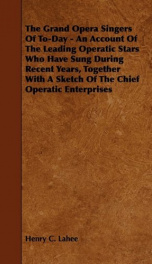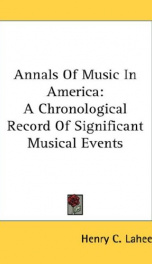famous singers of to day and yesterday

Purchase of this book includes free trial access to www.million-books.com where you can read more than a million books for free. This is an OCR edition with typos. Excerpt from book: CHAPTER III. MARIO TO TIETIENS. Contemporary with Sontag, Malibran, and Grisi, was Madame Schroder-Devri- ent, who was one of the earliest and greatest interpreters of German opera. Though others have surpassed her in vocal resources, she stands high in the list of operatic tragediennes, and for a long time reigned supreme in her art. Her deep sensibilities and dramatic instincts, her noble elocution and stately beauty, fitted her admirably for tragedy, in which she was unrivalled except by Pasta. Her voice was a mellow soprano, which, though not specially flexible, united softness with volume and compass. Her stage career began at the age of six, but she was seventeen when she made her debut in opera. Her highest triumph was achieved as Leonora in the " Fidelio." Her marriage with M. Devrient, a tenor singer whom she met in Dresden, did not turn out happily. Madame Devrient retired in 1849, having amassed a considerable fortune by her professional efforts. Her retirement occasioned much regret throughout Germany, and the Emperor Francis I. paid her the unusual compliment of having her portrait painted in all her principal characters, and placed in the Imperial Museum. She died in 1860 at Cologne, and the following year a marble bust was placed in the opera house at Berlin. Madame Devrient must be classed with that group of dramatic singers who were the interpreters of the school of music which arose in Germany after the death of Mozart, and which found its characteristic type in Carl Maria Von Weber, for Beethoven, whoon one side belongs to this school, rather belongs to the world, than to a single nationality. Fanny Persiani, who was contemporary with Grisi and Viardot, was the daughter of Tacchinardi, a tenor singer of no small reputation. Tacchinardi was a dwarf... --This text refers to an alternate Paperback edition.
Info about the book
Author:
Series:
Unknown
ISBN:
1104055058
Rating:
4.5/5 (2)Your rating:
0/5
Languge:
English
Users who have this book
Users who want this book
What readers are saying
What do you think? Write your own comment on this book!
write a commentif you like famous singers of to day and yesterday try:
Do you want to read a book that interests you? It’s EASY!
Create an account and send a request for reading to other users on the Webpage of the book!





